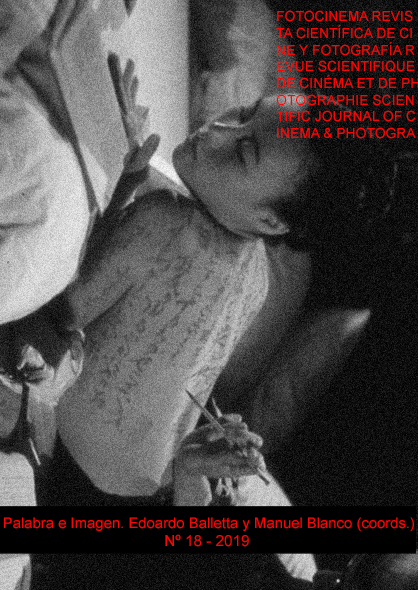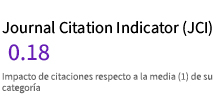Writer’s block in The Lost Weekend (Billy Wilder, 1945)
DOI:
https://doi.org/10.24310/Fotocinema.2019.v0i18.5527Keywords:
Writing, writer’s block, Billy Wilder, The Lost WeekendAbstract
The adaptation of Charles R. Jackson’s novel The Lost Weekend posed a first problem to the writers Billy Wilder and Charles Brackett: they could not explain the alcoholism of the protagonist from his homosexuality. They decided, therefore, to develop another theme, that of the writer's block. The responsibility of the writer on his words is raised in the film through the story of his “lost weekend”, in which his vision of the world will be nuanced from different types of writing, ranging from that one formed by simple indexes to the most complex symbolic writing. The end of the film does not only point to the redemption of the alcoholic, but to the learning of the ultimate meaning of writing, always according to the dominant mentality in classical Hollywood: the belief that writing only makes sense when its message goes beyond mere literature, urging readers / viewers to react in a certain way.
Downloads
Metrics
Publication Facts
Reviewer profiles N/A
Author statements
Indexed in
-
—
- Academic society
- N/A
- Publisher
- Universidad de Málaga
References
Bordwell, D. (1985). La narración en el cine de ficción. Barcelona, Paidós, 1996.
Bordwell, D. (1989). El significado del filme. Barcelona, Paidós, 1995.
Bordwell, D., Staiger, J. & Thompson, K. (1985). El cine clásico de Hollywood. Barcelona, Paidós, 1997.
Derrida, J. (1967). La escritura y la diferencia. Barcelona: Anthropos, 1989.
Fuentes, A. (2017). ¿Por qué la angustia no tiene sentido, pero sí causa?, La Vanguardia,
https://www.lavanguardia.com/vida/20170126/413686201444/angustia-el-divan-afliccion-psciologia-psicoanalisis.html (última consulta, 17-12-2018).
Heinich, N. (2000). Être écrivain. París: La Découverte.
Jackson, C. R. (1944). Días sin huella. Barcelona: Argos Vergara, 1981.
James, H. (1892): La vida privada, en Los papeles de Aspern. Barcelona: Seix Barral, 1985.
Kraus, K. (1924). Dichos y contradichos. Barcelona: Minúscula, 2003.
Metz, C. (1968-73). Ensayos sobre la significación en el cine. Barcelona, Paidós, 2002.
Metz, C. (1977). El significante imaginario: psicoanálisis y cine. Barcelona, Paidós, 2001.
Pueo, J. C. (2006). “’ANÁ?KH”, Escritura e imagen, 2, 2006, pp. 23-39.
Pueo, J. C. (2017). Vientos de guerra: oralidad y escritura en Enviado especial (Alfred Hitchcock, 1941), Tropelías, núm. extraordinario 2, Homenaje a José Antonio Pérez Bowie, pp. 462-471.
Room, R. (1984). A “Reverence for Strong Drink”: the Lost Generation and the Elevation of Alcohol in American Culture, Journal of Studies on Alcohol, 45/6, pp. 540-546.
https://www.robinroom.net/reverenc.htm (última consulta, 6-4-2018).
Rose, M. (1984). Writer’s Block: The Cognitive Dimension. Carbondale-Edwarsville: Southern Illinois University Press.
Sikov, E. (1998). Billy Wilder: vida y época de un cineasta. Barcelona: Tusquets, 2000.
Vila-Matas, E. (2000). Bartleby y compañía. Barcelona: Anagrama, 5.ª ed., 2002.
Wilder, B. & Karasek, H. (1992). Nadie es perfecto. Barcelona: Grijalbo, 4.ª ed., 1994.
Žižek, S. (1991). Mirando al sesgo. Barcelona, Paidós, 2000.
Downloads
Published
How to Cite
Issue
Section
License
All contents published in Fotocinema Revista científica de cine y fotografía are protected under the Creative Commons Attribution-NonCommercial-ShareAlike 4.0 International (CC BY-NC-SA 4.0) license. All about this license is available in the following link: <http://creativecommons.org/licenses/by-nc-sa/4.0>
Users can copy, use, redistribute, share and exhibit publicly as long as:
- The original source and authorship of the material are cited (Journal, Publisher and URL of the work).
- It is not used for comercial purposes.
- The existence of the license and its especifications are mentioned.
There are two sets of authors’ rights: moral and property rights. Moral rights are perpetual prerogatives, unrenounceable, not-transferable, unalienable, imprescriptible and inembargable. According to authors’ rights legislation, Fotocinema. Revista científica de cine y fotografía recognizes and respects authors moral rights, as well as the ownership of property rights, which will be transferred to University of Malaga in open access. The property rights are referred to the benefits that are gained by the use or the dissemination of works. Fotocinema. Revista científica de cine y fotografía is published in an open access form and it is exclusively licenced by any means for doing or authorising distribution, dissemination, reproduction, , adaptation, translation or arrangement of works.
Authors are responsable for obtaining the necessary permission to use copyrighted images.














13.png)



